While Americans spent the 4th of July doubling down on hot-dogs and freedom, Brits elected Sir Keir Starmer as the UK’s 58th prime minister, ending 14 years of Conservative Party rule. The king will swear him in later today (Friday).
This result was huge – historic even – and yet also completely unsurprising. Let’s start with the historic bit. The count is being finalised right now, but it looks like:
- The Conservative Party’s worst result in its 190-year history
- A Labour majority just shy of Tony Blair’s 1997 record, and
- Labour’s biggest-ever turnaround (it only just suffered its worst defeat in a century in 2019).
So that takes us to the less surprising bit – why did this happen?
Stay on top of your world from inside your inbox.
Subscribe for free today and receive way much more insights.
Trusted by 134,000+ subscribers
No spam. No noise. Unsubscribe any time.
The last 14 years have been tumultuous: Brexit, Boris, Covid, the lettuce, and so on. And while this all played out, Brits got hit with high inflation, high debt, low wages, creaking public services, and a creeping sense of malaise.
So it was always going to be a tough gig for Rishi Sunak, who took the reins in 2022. He rolled the dice with early elections, only to limp to the finish line with this week’s awkward breakfast TV appearance alongside “Britain’s most-tattooed mum”.
But lest you feel too much sympathy for Rishi, remember he’s also been the UK’s richest-ever PM, and his family is still wealthier than the king.
So does Sunak’s loss mean everyone loves Starmer? No.
The UK’s ‘first-past-the-post’ electoral system, plus strong performances from smaller parties, all mean Starmer’s landslide win actually comes despite his party garnering a smaller share of the vote than in 2019 or 2017.
And other than for his truly exceptional hair (see pic above), folks are still getting to know the guy. That’s partly by design, and partly by character: it’s by design in the sense that he ran a classic ‘small target’ race that tapped into national disillusionment (his slogan was ‘change’), after dragging his party to the centre.
And it’s by nature because he’s a driven but seemingly reserved guy: from his working class roots, he gained a national profile as a barrister defending (for example) vegan activists against McDonalds, before jailing terrorists as the country’s top prosecutor (that’s partly how he got knighted).
But in opposition, Sir Keir has cultivated an image of a pragmatist tackling the problems folks care about: end the political chaos, stabilise the economy, and restore public services.
So what does Starmer mean for the UK’s role in the world?
More of the same for now. That’s because, first, the UK’s major parties are pretty aligned on big issues: they’re pro-NATO, pro-Ukraine, and pro-Israel, though Labour has defended the International Criminal Court’s independence after it issued arrest warrants for Israeli (and Hamas) leaders.
And second, we’re unlikely to see major changes abroad, because Starmer’s priorities are (as above) really domestic. And sure, if he can make headway at home, that’ll restore the UK’s standing and influence abroad.
But Sir Keir has consistently sought to manage those expectations, cautioning that there’s no “magic wand” or “switch” to immediately fix the UK’s problems.
INTRIGUE’S TAKE
This all looks less like a ‘surge’, ‘lurch’, or other dramatic verb to the left, and more like an act of retribution, purging, or other dramatic verb against an incumbent. And that’ll be familiar to any Intriguers who’ve followed us through this year’s elections in South Africa, India, France, and beyond.
But either way, Starmer is now PM, riding on a historic win. So what now?
Zooming out, his manifesto’s chapter on the world includes some solid lines (“Britain will be a reliable partner, a dependable ally, and a good neighbour”), as well as some familiar ones across the West (“we will co-operate where we can, compete where we need to, and challenge where we must” on China).
But the point of that document was really to assure voters he’ll be a safe pair of hands, rather than to chart some major new course. So for now, we’ll likely see Starmer in Washington for next week’s 75th anniversary NATO summit, reiterating the UK’s alliance commitments.
And thereafter, as much as folks may want him to focus back home, this world of ours rarely grants leaders that luxury.
Also worth noting:
- Starmer’s presumed foreign secretary, David Lammy, has vowed an approach to the world that’s marked by “progressive realism” (“using realist means to pursue progressive ends”) and “securonomics” (eg, tasking British ambassadors abroad to deliver “growth and security to the UK economy”).
- This election has seen some high profile folks lose their seats, like defence secretary Grant Shapps and former PM Liz Truss.Other big names won seats, like former Labour leader (and now independent) Jeremy Corbyn, plus EU/migration-sceptic Nigel Farage. There were 650 seats up for grabs, with Labour now holding ~412 of them.
- Starmer was long rumoured to be the inspiration behind Colin Firth’s character in the Bridget Jones books and films. But settle down – the original author put the rumours to bed in 2020.








